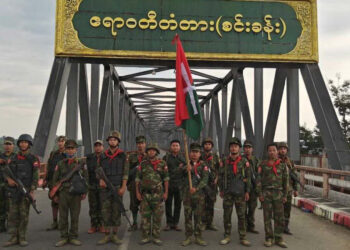On 1 April, more than six million Burmese were eligible to go to the polls to elect less than seven percent of the nation’s parliamentary seats. As we celebrate what seems to be a landslide by Aung San Suu Kyi’s party, the National League for Democracy (NLD), we must remember that this victory took place against great odds.
The regime’s handpicked Union Election Commission (EC) failed to act as an impartial, effective and independent body. Despite publicly announcing that the by-elections would be free and fair, the Burmese authorities and EC have repeatedly obstructed campaign activities of the NLD. Widespread irregularities, threats, harassment, vote buying and censorship have marred the electoral process.
On Friday, Suu Kyi told a news conference, “I don’t think we can consider it a genuinely free and fair election if we consider what has been happening here over the last few months.” According to AFP, the democracy leader explained, “It is the rising political awareness of our people that we regard as our greatest triumph …We don’t at all regret having taken part.”
Even today, Nyan Win, secretary of the NLD campaign committee, lodged a complaint to the EC that there had been widespread reports of wax put over the check box for the NLD on ballot papers, which could be rubbed off later to cancel the vote.
But the NLD was not the only target of irregularities. On March 24, the EC postponed voting in all three Kachin State constituencies citing “security concerns”—disenfranchising over 200,000 voters in the process.
In the fraudulent elections of November 2010, the regime also similarly canceled voting in more than 3,400 villages in ethnic areas. Ethnic nationalities have long demanded a just political solution to their grievances, and this only serves to aggravate the root causes of armed conflict
Some officials argue that free and fair by-elections should lead to the lifting of economic sanctions. While the election result is favorable to the NLD, the ballot has hardly been free or fair. More importantly, genuine change must be defined by bold institutional, legislative and policy reforms that can decisively create a truly democratic, inclusive and accountable government based on the rule of law and respect for all human rights.
For the majority of people in Burma, there has been little real change. The quasi-civilian administration has made small gestures calculated to generate maximum excitement in the international community with minimum cost to high-ranking officials and their cronies.
In many cases they either delivered a small part or did a complete U-turn on their promises. In August there was much publicity about the planned release of all political prisoners, yet only 302 were finally released in January, leaving more than 900 others behind bars.
Similarly the suspension of the Myitsone Hydropower Dam project in September was widely lauded, but it was revealed last month that the construction company had never actually left the site and 10 residents were arrested for returning to their homes in the area.
The truth is that Burma’s authorities will not implement genuine and irreversible reforms unless there is continued pressure from both inside and outside the country. Leverage must be exercised alongside a system of checks and balances to realize enduring reforms. It is as simple as that. We still need to push forward so that the following key minimum benchmarks are met:
- Immediate and unconditional release of all remaining political prisoners.
- Nationwide ceasefires leading to sustainable peace and an end to systematic and pervasive human rights violations—including the rape of women in ethnic areas.
- A genuine and inclusive dialogue with all political parties, other pro-democracy forces and ethnic nationality groups.
- Justice and accountability for past and present human rights abuses.
The international community must press for urgent steps to meet these benchmarks and to initiate substantive reforms without delay. These steps, more than the by-elections, are the real litmus test of whether the Burmese government genuinely intends to build a lasting peace and ensure the protection of all human rights.
Soe Aung is the deputy secretary for foreign affairs of Forum for Democracy in Burma (FDB), a democratic political coalition of organizations and individuals who have engaged in different types of struggle since 1988. The FDB stands as a dynamic force for the achievement of democracy and national reconciliation in Burma through political campaigns, by empowering people of Burma, by promoting the role of women and by promoting trust and solidarity among the democratic opposition.
















